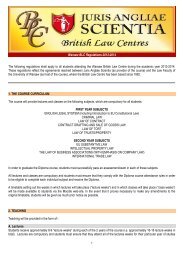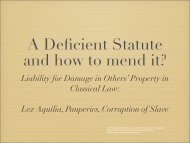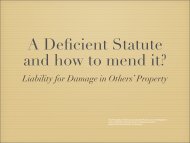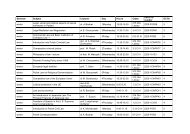Presentation
Presentation
Presentation
Create successful ePaper yourself
Turn your PDF publications into a flip-book with our unique Google optimized e-Paper software.
Good Faith: the origins<br />
Cicero, on good conduct, 3.65-66: In the laws pertaining to the sale of real property<br />
it is established by jurisprudence that when a transfer of any real estate is made, all<br />
its defects shall be declared as far as they are known to the vendor. According to the<br />
laws of the Twelve Tables it used to be sufficient that such faults as had been<br />
expressly declared should be made good and that for any flaws which the vendor<br />
expressly denied, when questioned, he should be assessed double damages. A like<br />
penalty for failure to make such declaration also has now been secured by our<br />
jurisconsults: they have decided that any defect in a piece of real estate, if known to<br />
the vendor but not expressly stated, must be made good by him. For example, the<br />
augurs were proposing to take observations from the citadel and they ordered<br />
Tiberius Claudius Centumalus, who owned a house upon the Caelian Hill, to pull<br />
down such parts of the building as obstructed the augurs' view by reason of their<br />
height. Claudius at once advertised his block for sale, and Publius Calpurnius<br />
Lanarius bought it. The same notice was served also upon him. And so, when<br />
Calpurnius had pulled down those parts of the building and discovered that Claudius<br />
had advertised it for sale only after the augurs had ordered them to be pulled down,<br />
he summoned the former owner before a court of equity to decide "what indemnity<br />
the owner was under obligation 'in good faith' to pay and deliver to him." The verdict<br />
was pronounced by Marcus Cato, the father of our Cato (for as other men receive a<br />
distinguishing name from their fathers, so he who bestowed upon the world so<br />
bright a luminary must have his distinguishing name from his son); he, as I was<br />
saying, was presiding judge and pronounced the verdict that "since the augurs'<br />
mandate was known to the vendor at the time of making the transfer and since he<br />
had not made it known, he was bound to make good the purchaser's loss."














